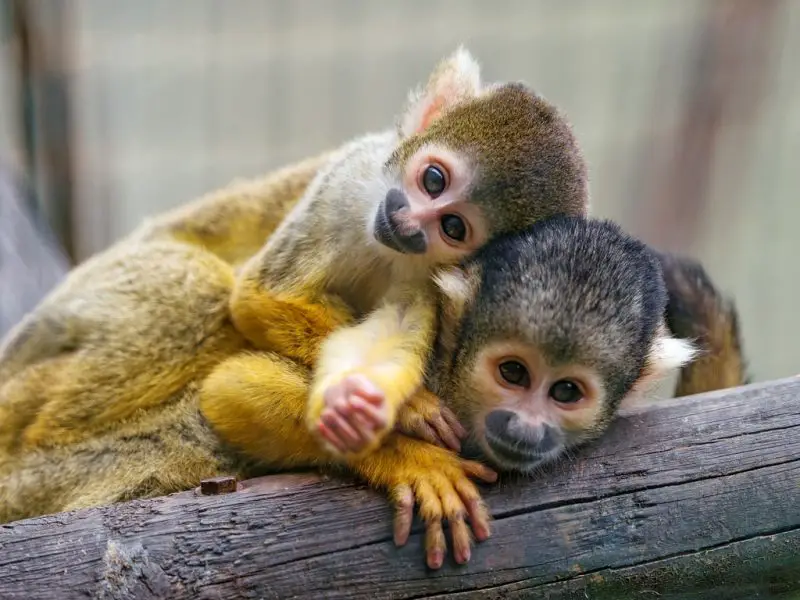Owning a monkey might sound like an exciting idea — after all, they are intelligent, expressive, and often seem almost human. But in the state of Ohio, keeping a monkey as a pet is far from simple. Following several high-profile incidents involving exotic animals, Ohio passed one of the strictest exotic animal laws in the United States.
If you’ve ever wondered whether you can legally own a monkey in Ohio, this comprehensive guide covers everything you need to know — including what species are banned, what permits are required, the penalties for violations, and what alternatives you have if you truly love primates.
Ohio’s Exotic Animal Laws Explained

The History Behind Ohio’s Exotic Animal Restrictions
Before 2012, Ohio had some of the weakest exotic animal laws in the country. People could freely own wild animals such as lions, tigers, and monkeys without much regulation. This changed dramatically after a tragic incident in Zanesville in 2011, when a man released dozens of wild animals — including primates — before taking his own life.
The event caused chaos and prompted an immediate review of Ohio’s animal ownership laws. As a result, the Ohio Dangerous Wild Animal Act (Senate Bill 310) was passed in 2012 and went into effect in January 2014. This act established strict rules for anyone wishing to own, buy, or breed exotic species, including most types of monkeys.
What the Ohio Dangerous Wild Animal Act Says
The Ohio Dangerous Wild Animal Act makes it illegal to own, buy, sell, trade, or breed “dangerous wild animals” without a special permit. The list of restricted animals includes apes, monkeys, lemurs, and other non-human primates.
While not all monkey species are listed as “dangerous,” the vast majority fall under the restricted category because they can carry diseases, cause serious injuries, and pose public safety risks.
In other words, unless you have a valid permit issued by the Ohio Department of Agriculture (ODA), owning a monkey in Ohio is generally illegal.
What Monkey Species Are Restricted or Banned
Commonly Restricted Monkey Species in Ohio
Under the Ohio Dangerous Wild Animal Act, the following primates are generally prohibited:
- Chimpanzees
- Gorillas
- Orangutans
- Macaques
- Baboons
- Lemurs
- Capuchin monkeys
- Squirrel monkeys
While small monkeys like marmosets or tamarins might seem harmless, they too fall under close scrutiny and usually require special authorization to possess.
Why All Monkeys Are Treated as Dangerous
Ohio classifies most primates as dangerous because of their unpredictable behavior and potential to transmit diseases such as herpes B virus or hepatitis. Even small monkeys can become aggressive as they mature, especially if kept in isolation or without proper social interaction.
These risks, combined with the ethical concerns of keeping intelligent primates in captivity, are why the state maintains a hard stance on private ownership.
Permits and Exceptions
Can You Get a Permit to Own a Monkey in Ohio?
Yes, but only in very limited circumstances. Permits are generally not granted for personal pets. The Ohio Department of Agriculture only issues permits to:
- Accredited zoos
- Licensed research facilities
- Sanctuaries approved by the ODA
- Educational institutions with valid justification
Private individuals cannot typically obtain a permit just because they want a monkey as a companion animal. Even those who legally owned monkeys before the 2014 law had to register their animals, implant microchips, and meet strict enclosure and safety requirements.
Registration Requirements for Existing Owners
When the law took effect, Ohio gave existing monkey owners a short grace period to register their animals. Those who failed to do so had to surrender their monkeys or face fines and criminal charges.
All registered monkeys had to:
- Be microchipped for identification
- Be kept in secure, ODA-approved enclosures
- Have liability insurance coverage
- Be inspected regularly by the Ohio Department of Agriculture
Failure to meet these requirements could result in animal confiscation and heavy penalties.
Penalties for Illegal Monkey Ownership in Ohio
What Happens If You Own a Monkey Without a Permit
Owning a monkey illegally in Ohio can lead to severe consequences. Under the state’s laws, the penalties include:
- First-degree misdemeanor for first-time offenses (up to 180 days in jail and $1,000 fine)
- Fourth-degree felony for repeat offenses (up to 18 months in prison and $5,000 fine)
- Immediate confiscation of the animal by authorities
- Permanent ban from future ownership
In addition to criminal penalties, violators may also face civil fines and must cover the cost of animal transport, care, and relocation.
Public Safety and Liability Issues
If a monkey injures someone or escapes, the owner is fully liable for any damages or injuries caused. Given that monkeys are classified as exotic and dangerous, homeowners’ insurance policies rarely cover such incidents — leaving owners financially exposed.
Why Ohio’s Monkey Laws Are So Strict
Lessons from the Zanesville Incident
The 2011 Zanesville incident was a turning point for Ohio. Dozens of exotic animals, including primates, were released into the community, leading to a public safety emergency. Local authorities had to euthanize many animals to prevent injuries or deaths.
The chaos exposed Ohio’s lack of regulation and set a national example of how quickly exotic animal ownership can spiral out of control. As a result, the state decided to enforce one of the toughest exotic animal laws in the country.
Protecting Public Health and Animal Welfare
Monkeys are highly intelligent creatures that require complex social, emotional, and environmental enrichment. Keeping them in captivity as pets often leads to behavioral problems and neglect.
Additionally, primates can carry zoonotic diseases that may infect humans. The state’s strict stance reflects a desire to protect both citizens and animals from harm.
Alternatives to Owning a Monkey in Ohio
Volunteering or Working with Monkeys
If you love monkeys, there are safer and more ethical ways to interact with them. Many accredited zoos and wildlife sanctuaries in Ohio offer volunteer programs or educational opportunities.
These programs allow you to learn about primate care, enrichment, and conservation without the legal or moral complications of private ownership.
Visiting Accredited Sanctuaries
Some sanctuaries in nearby states, such as the Primate Rescue Center (Kentucky) or Jungle Friends Primate Sanctuary (Florida), accept visitors and volunteers. Spending time at such facilities can provide valuable insight into what it truly takes to care for primates responsibly.
Supporting Conservation Efforts
Instead of owning a monkey, you can contribute to wildlife conservation organizations that protect primates in the wild. Supporting these groups helps ensure that monkeys can live in their natural habitats, where they belong.
Ethical Considerations of Keeping Monkeys as Pets
The Psychological Impact on Monkeys
Monkeys are highly social animals that live in complex groups in the wild. Keeping a single monkey as a pet can lead to loneliness, depression, and aggressive behavior. Many pet monkeys end up being abandoned or surrendered once they mature and become difficult to handle.
The Welfare Issue
Even with proper care, a home environment cannot meet a monkey’s physical and emotional needs. They require specialized diets, large enclosures, and constant social interaction with their own species — things that most private owners cannot provide.
This is why animal welfare organizations like the Humane Society and the American Veterinary Medical Association oppose keeping primates as pets.
Comparison with Other States
Where Monkey Ownership Is Legal in the U.S.
The legality of owning a monkey varies by state. Some states, such as Nevada and Alabama, have very few restrictions. Others, like California and New York, have outright bans similar to Ohio.
States that allow private ownership often require detailed permits, facility inspections, and proof of experience.
How Ohio Compares
Ohio’s laws are among the strictest, rivaling those of California, Hawaii, and Massachusetts. While some neighboring states may have looser restrictions, transporting a monkey across state lines without federal permits violates federal law under the Lacey Act.
In short, Ohio residents have very little legal ground to keep monkeys, and attempting to do so can lead to both state and federal penalties.
Common Myths About Owning Monkeys
“Small Monkeys Are Safe to Keep at Home”
Even small monkeys can bite, scratch, and spread diseases. They grow stronger and more unpredictable as they age, which makes them unsafe for household environments.
“If I Raise a Monkey from Birth, It Will Stay Tame”
Domestication takes thousands of generations. A monkey raised in captivity does not lose its natural instincts. Many incidents of aggression involve monkeys that were hand-raised from infancy.
“Monkeys Make Loyal Companions Like Dogs”
Monkeys are not domesticated pets. Their social needs, communication methods, and behaviors are entirely different. They often become frustrated or depressed when isolated from their kind.
What to Do If You Find a Monkey in Ohio
Contact Authorities Immediately
If you find or encounter a monkey in Ohio, contact your local animal control agency or the Ohio Department of Agriculture. Do not attempt to capture, feed, or approach the animal.
Escaped monkeys may carry diseases or behave unpredictably when frightened.
Rehabilitation and Placement
Authorities will typically transport the monkey to a licensed sanctuary or rehabilitation center. If the animal was illegally kept, its owner may face fines or criminal charges.
Final Thoughts
Owning a monkey in Ohio might sound fascinating, but the legal and ethical realities make it nearly impossible. Ohio’s laws are designed to protect both people and animals — and for good reason. Monkeys require specialized care that few private individuals can provide safely.
Instead of attempting to keep one as a pet, consider volunteering, donating, or supporting reputable primate sanctuaries. This way, you can still be part of the effort to protect and understand these incredible creatures — without breaking the law or causing harm.
Frequently Asked Questions
Is it completely illegal to own a monkey in Ohio?
Yes, for most people it is. Only licensed facilities like zoos, research institutions, or sanctuaries approved by the state can own monkeys.
What if I already owned a monkey before 2014?
You were required to register it under the Ohio Dangerous Wild Animal Act, microchip it, and meet strict standards. Failure to do so made ownership illegal.
Can I adopt a monkey from another state?
No. Importing a monkey into Ohio without a valid permit is illegal under both state and federal law.
Are there any legal small primates to keep in Ohio?
Not really. Even small species like marmosets or capuchins fall under the same restrictions.
What happens to confiscated monkeys?
They are usually sent to accredited sanctuaries or rehabilitation centers where they can receive proper care.






